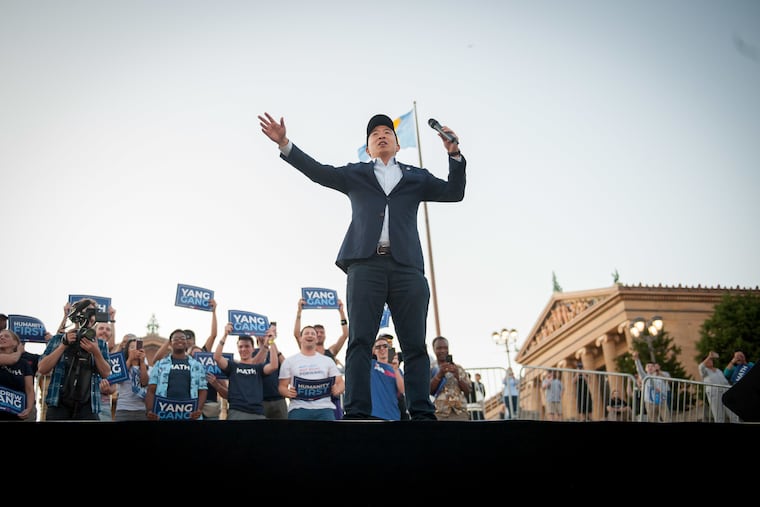Andrew Yang celebrates ‘nerdiest campaign in presidential history’ at Rocky steps rally
The crowd chanted “Math! Math! Math!” whenever Yang mentioned numbers or data and called out what they'd do with $1,000 a month.

Andrew Yang bounded up the Art Museum steps, arms stretched overhead, as several hundred supporters waved “MATH” signs.
For an hour, the crowd would chant “Math! Math! Math!” whenever Yang mentioned data and roar at his promise that the State of the Union in his presidency would include a PowerPoint presentation with better metrics.
“This is the nerdiest campaign in presidential history,” Yang said as curious runners circumnavigated the crowd.
Yang, 44, is an entrepreneur who has risen to the middle of the pack and stayed there. While governors and senators have dropped out, unable to meet polling or fund-raising thresholds for debate airtime, Yang has hit each benchmark, fueled by his huge network of online supporters. And he’s one of the few candidates to gain ground in polls.
His campaign style is a conversational economics lesson interlaced with humor. His candidacy is built on the theory that the millions of jobs lost to automation (think kiosks in drugstores and airports) led to the sense of frustration and instability among Americans that was linked to President Donald Trump’s election.
He paints a gloomy picture of what automation will do to the future job market and offers a solution: a freedom dividend for every American over the age of 18.
“The first time you heard of me you probably heard, ‘Hey, there’s an Asian man running for president who wants to give everyone $1,000 a month.’ Remember that, Philadelphia?” he said. “And ... you thought it was a joke.”
The idea of a dividend, Yang argues, is one Thomas Paine and Martin Luther King Jr. and hundreds of economists have supported. Alaska gives its citizens $1,000 to $2,000 a year. He says he’d pay for his policy with a tax on tech companies like Amazon.
On the debate stage last week Yang tried to drum up attention for the idea by announcing he’d give 10 families $1,000 a month from his campaign for a full year.
Some of his rivals scoffed. Election-law experts have questioned whether the move would be legal (Yang’s campaign has said lawyers have assured them it is). But after the Sept. 12 debate, his campaign raised $1 million in less than a week. More than 450,000 people have signed up to enter the contest — which means hundreds of thousands of email addresses for campaign mailing lists. He told reporters after the rally the chosen families, selected at random, would be announced next week.
For Yang supporters the freedom dividend represents what they could do if they weren’t living on tight margins.
“Pay off my student loans!” “Open my own business!” “Day care!” people shouted when Yang asked how they’d use the money.
Yang drew a crowd of about 400, mostly younger, faithful supporters who clearly do their homework. When he discussed the need to replace GDP as the measurement of economic success, he said U.S. life expectancy had dropped three years in a row for the first time ... "since when?”
“1918!” many shouted (correctly).
“That’s right, 1918, the year that the Spanish flu, a global pandemic, killed millions,” he said.
“I’ve never seen a candidate who sees the issues and responds to them in a way that is not just these platitudes,” said Nikhil Lakhani, 21, a senior at the University of Pennsylvania and a founder of the Philly Yang Gang. “He doesn’t just say, ‘Oh here’s an anecdote.’ He says, ‘Here’s the data.’ ”
Yang’s supporters, Lakhani said, appreciate that in a political era when emotions often eclipse facts.
Many in the crowd said Yang is refreshing. He’s unapologetically himself — with a tendency toward self-deprecating humor. Videos of him doing the Cupid Shuffle and crowd surfing have gone viral. He says he’s the opposite of Donald Trump: “An Asian guy who’s good at math.” (Those MATH hats stand for Make America Think Harder.)
Some of his humor about being Asian hasn’t always landed. In the last debate, while discussing health care, he cracked that he “knows a lot of doctors," sparking criticism that he propagates stereotypes.
“I think Americans are very smart and that they can actually see right through that kind of myth and, if anything, by poking fun at it, I’m making Americans reflect a bit more,” Yang said on CNN.
He also came to the defense of fired SNL comic Shane Gillis, who had made jokes about Asians, including Yang. Gillis shouldn’t have lost his job, Yang said. “I believe that our country has become excessively punitive and vindictive about remarks that people find offensive or racist," he said.
Conan Liu, 26, a medical student at Jefferson, said he thinks Yang’s humor is part of his appeal. “I think the majority of people know he’s joking. He’s not trying to stereotype Asians, he’s just playing off typical expectations." Liu said Yang’s humor makes it “easier to get into the math.” He thinks the monthly $1,000 could help people offset medical bills.
Yang, raised in Upstate New York, was CEO of a Manhattan test-prep company that he sold to Kaplan in 2009. He created Venture for America, to place recent college graduates in start-ups in struggling cities.
“The people that do support him go all in,” said Brittany Anderson, 26, the volunteer regional campaign director in Pennsylvania, which has six “Yang Gangs.”
“The more we spread awareness of who he is and his unique ideas, I think the game has a high chance of shifting.”